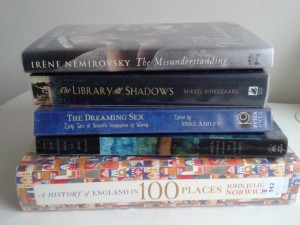As part of my writerly research, I went to the library to review the first page of several novels – my purpose was not to write a whole book review. I was particularly interested in what hooks a reader into a story, what keeps them keep reading, and how are first pages written and constructed to do just this.
(From A Novel in a Year):
“Read as if your life depended on it because your life as a writer does.” Doughty L., A Novel in a Year, Simon & Schuster UK Ltd, London, 2007.
At the library, I picked four of their new books at random and reviewed their first page.
Here’s my thoughts upon reading their first pages:
Némirovsky I., The Misunderstanding, Shatto & Windus, London, 2012.
I like the long, complicated sentences on this page. There is mention of tamarisk trees – I have no idea what these are, but it awakens my curiosity.
I like the phrase, “…the particular scent and taste of the air.” This brings back childhood memories or a cruise we took from Perth, Australia to Singapore. The mix of diesel engines and sea spray takes me right back to this ship, on the sea level deck, at the very edge of the ship, stepping over huge coils of thick rope, playing hide and seek with a bunch of other kids. We were not meant to be down there, there were ‘crew only’ signs all over the place, and we could read, but this was part of the allure and no one stopped us.
So my first read taps into a personal memory of smell and place. I am connected to the book now and will read beyond the first page.
My aim was to look at contemporary novels, but on closer inspection, once I had the books home, I found that The Misunderstanding was actually first published in 1926, but this translation was published in 2012. It is a small book, I’m already a third of the way into it. It is very like Flaubert’s Madam Bovary, which I studied and, to my surprise, loved during my literature degree. So I guess it is no surprise, therefore, that I am enjoying this book. However, it is slow and detailed and the voice is old-fashioned. Not a complete loss, any reading is better than none, but not the contemporary reading I had in mind.
Farah N., Crossbones, Granta Publications, London, 2011.
There is a simile that I like: “He climbs out gingerly, like a spider crawling into a crevice.” I am a little curious about who this ‘boy’ is and why the drivers dropping him off don’t think highly of him. However, I soon lose interest at the mention of old ‘army hands’ and not wishing to be killed…it becomes clear that this has something to do with war or a soldier’s story and this is not what I am interested in reading.
It is not the writing style so much as the topic that I am not interested in. I will not read on, I return this book to the shelf.
Birkegaard M., The Library of Shadows, Transworld Publishers, London, 2009.
I like the title of this book, it evokes a sense of mystery and has some relation to books, which I love.
The main character is called Luca and I like that, it is a name I have chosen before for one of my own stories.
Luca is the owner of an antiquarian bookshop and wants to dies surrounded by his books. I like the bookstore setting and the romantic idea of Luca’s demise. There is mention that this is Luca’s last night…I’m hooked. What happens to him? How Why?
I add this book to my now pile of two. I will read this one.
Hensher P., Scenes from Early Life: a novel, HarperCollins Publishers, London, 2012.
The writing feels awkward and the references to Churchill do not compel me. There is little description of setting, but there is some description and backstory of the characters, however, I don’t bond in any way to these characters.
This one goes back on the shelf. Here’s what I came home with in the end:
Two out of four novels selected to read, not too bad. I have learnt that what hooks me in from a quick read of a novel’s first page is developing (very quickly) some connection to the character(s) and/or a finding a sense of place that resounds within me in some personal way.
I think I will try doing this again. I have questions about how to formulate my own opening page in such a way as to hook in as many readers as possible. Also, I wonder if I am attracted to the same kind of characters, if this is simply my personal likes and dislikes, or if there is something in the way the author presents the character that can have a broader appeal than simply a reader’s personal preference of reading material.





In a 2012 article in The Guardian, Jeanette Winterson says, “Writing should be personal but not insular. If we are not readers we cannot be writers. Reading widely is necessary. A course that encourages students to read outside their own interests will expand what they have to say.” I couldn’t agree more – read a variety of things as often as possible!
Hi Sue,
Thanks so much for your comments. Jeanette Winterson is a fabulous writer. And in the words of another ‘great’…“The more that you read, the more things you will know. The more that you learn, the more places you’ll go.” Dr. Seuss.